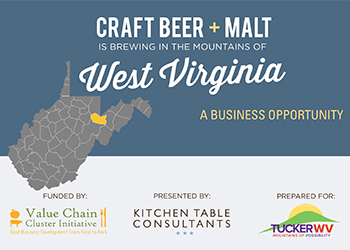
Case Study: Uncovering Opportunities in Tucker County, West Virginia
THE NEED
With state budgets cut, the Tucker County Economic Development Authority was experiencing financial pressure to create revenue from their land and building assets. They owned a 6,000 square foot industrial building located on 160 acres of land with road access and utilities, ready to become a vibrant business park.
INITIAL THINKING ON OPPORTUNITIES
With the vacant building located directly on the nearly completed new highway, the property appeared well suited for businesses that needed easy access to transportation infrastructure. The local leadership and development community initially considered either a meat processing facility or a food hub for vegetable aggregation and distribution – to assist local farmers with distribution of their crops to larger markets such as Washington DC.
BACKSTORY
The Development Authority (DA) approached the Value Chain Cluster (VC2), an initiative that works to strengthen local food and farm businesses in West Virginia, to request advice on the viability of a meat processing plant in Tucker County, given the # of cattle in the area. VC2 surveyed the meat processing landscape and determined that there appeared to be ample supply to service the demand. The Development Authority then asked VC2 if they could help them uncover which opportunities would be most viable in the local farm and food ecosystem.
RESEARCH OBJECTIVE
VC2 enlisted the support of Kitchen Table Consultants (KTC) to conduct in-depth industry and market research, both academically and in the field. The objective was to discover not only WHAT types of business ventures would be the viable in Tucker County, but also uncover WHO might be willing and able to drive their development. In other words, KTC set out to discover and shape the most promising opportunities and identify the entrepreneurs or business leaders with the resources and drive to transform these concepts into reality.
Research and Deliverables
PHASE 1 – BACKGROUND AND STAKEHOLDERS
KTC studied the local food system by reading reports from local consulting firms and analyzing agricultural census data. Next KTC identified key community assets, opportunities, challenges and threats that any new food opportunity would need to consider. KTC identified and held meetings with the local area’s key stakeholders to start building a list of potential opportunities, and other community members to solicit input.
PHASE 2 – THE FIELD RESEARCH
KTC conducted a week of focused field research throughout the region, interviewing over 20 thought-leaders, farm and food industry players, government and nonprofit leaders. KTC developed a questionnaire to help structure the conversations. The in-person interviews were recorded for documentation purposes. Along the way, KTC used their findings to build and refine the list of potential opportunities. These results were then summarized and shared with the client and key stakeholders for feedback.
PHASE 3 – THE TOP 3 OPPORTUNITIES
KTC solicited client feedback on their findings and synthesized the field research into a final set of three top recommendations for the “Highest/Best Use” projects that aligned with the strengths and needs of the community and appeared to be the most viable and worth pursuing. KTC presented the top 3 recommendations to the client in a PowerPoint presentation.
PHASE 4 – THE BEST OPPORTUNITY
After the client selected the single most viable opportunity that they wanted to focus on, KTC conducted further follow-up interviews with the most relevant stakeholders. KTC then discussed with the client what type of deliverable would be the most valuable in helping them pursue the opportunity. A final pitch book was designed to provide the client with an easy way to communicate the opportunity to potential entrepreneurs and partners.
The Final Deliverable
KTC provided Tucker County Development Authority with a pitch book that made it easy for them to share the context and details of the opportunity and provided a framework for discussion with both potential funders, as well as potential drivers. KTC also provided meaningful introductions and contacts of potential entrepreneurial tenants for the new industrial park.
The Big Opportunities for Tucker County
With its strong outdoor recreation tourism and growing number of breweries, the Development Authority (in collaboration with KTC) concluded that the most compelling opportunity for Tucker County is to grow the county’s craft brewery industry.
SPECIFICALLY, THE COUNTY AIMS TO ATTRACT:
- New craft breweries.
- New craft brewery facilities for established breweries who want to expand.
- An entrepreneur (or established malt house company) to start West Virginia’s first craft malt house to support and supply the growing number of craft breweries in the state and beyond.
Client Feedback
Jen, I want to thank you, Noah and the rest of the KTC team for your expertise. With your valuable recommendations we can make sure that we are focusing our energies in the best direction. This final document is going to immediate use as we reach out to potential members of our industrial park. KTC’s understanding of our unique qualities and needs will help us reach our strategic goals. I want to also thank VC2 for matching us with a consulting firm with the talent and sensitivity to help this small but growing community.
Anne H. Jones
Executive Director,
Tucker County Development Authority